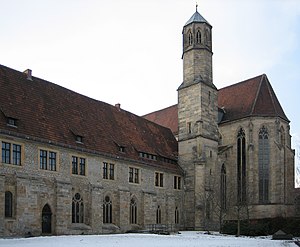I was absolutely delighted to hear in concert the Deus in Adjutorium from the larger Vespers service by Johann Pachelbel. The performers were the Howard Payne University Concert Choir directed by Monte Garrett. I had no idea that this composition even existed. It was as delightful as any Vespers I’ve ever heard, and had me on on the edge of my seat from the first to the last.
In my own mind, I imagined the liturgical context for this piece, remembering that this was written to be a form of public prayer of a very special sort. The Baroque sound and technique must have been an amazing revelation for that generation, as the building out of the Gregorian tradition proceeded at a breakneck pace. The chant of course is what made this tradition possible. It certainly would never have come about without the core material as provided by the chant: its text, its musical structure, and its liturgical purpose.
I heard in this music ebullient expressions of hope for humanity, reflective of the rising prosperity, the greater chances for everyone, even the lowest peasants, to enjoy a better life and advance materially and socially. What a time it must have been, a singular moment in history. The religious wars had ended. The world was trading. Human rights were advancing. Plagues and disease were abating. In so many ways, Catholicism helped usher it in and promised to lead civilization into a brighter future. These hopes are expressed by the lightness and orderliness of the compositions here.
In our own times, this music expresses the same but the hope we hear is broader, not just of a better material life but of a better mode of living in every respect. Pachelbel knew nothing of the horrors of the last century, but the sweetest of his compositions still point the way, through the public prayer of the Church, to a special kind of beauty that transcends time and exists within the transcendent realm that liturgical exists and to touch and reveal to us. We hear even in the relatively barren realm of the concert hall.
Everyone who longs for better art in liturgy has attended a concert of this type of music and left with a sense of sadness for its banishment from its rightful home and setting in the Catholic Church. I’ve gotten used to this sense of sadness for decades.
But last night, and for the first time, I did not feel that. I had a sense of hope toward the liturgical progress in our time. This music is now making its return to its home. We no longer need to feel a sense of loss. Given everything that is taking place in the liturgical world of Catholicism, we can change our outlook and know that the work we do – through practice, prayer, and wise management – will be fulfilled in our own time.
Pachelbel’s Vespers can come home again and live again.


I wonder which setting it was…he set that text 12 times.
I wish I could share your optimism. As long as the church is busy paying abused children and community organizers, it's not going to come up off the dime for such music….especially in a musical culture where everyone is supposed to sing everything. But one can hope; certainly the Ship of Church finally has its bow pointed in that direction.
I don't have my edition at hand/home, Jeffrey's. I do have a fond spot for one of them as I programmed it for my Master's Recital. That setting featured soprano and alto soloist sections, which my wife and sister in law sang respectively. The kids in Fresno State's Concert Choir loved it, along with all my selections, which were sacred, not believing that this work was from the pen of "that Kanon in D" guy.
I've got my recital on VHS. Suppose I should digitize it.
As I remember I programmed Stravinski PATER NOSTER, Palestrina "Sanctus/Benedictus" of MISSA MARCELLI, AVE MARIS STELLA from both Norwegian contemporary Trond Kverno and Edvard Grieg's, the Pachelbel, Distler's "FUEHRWAR…/SURELY BY HIS STRIPES WE WERE HEALED" and the others escape memory. Back in '88.
ive gotten a HUGE amount of mileage from his organ fugues on the magnificat. at least twice a month as preludes.
those baroque guys were prolific as hell. tons of church music by pachelbel scarlatti buxtehude and others are just lying around collecting dust. we lost much of this stuff when the allies bombed dresden but when one realizes that even most of palestrina hasnt been heard in hundreds of years…. then one can be grateful for the treasures waiting to be uncovered